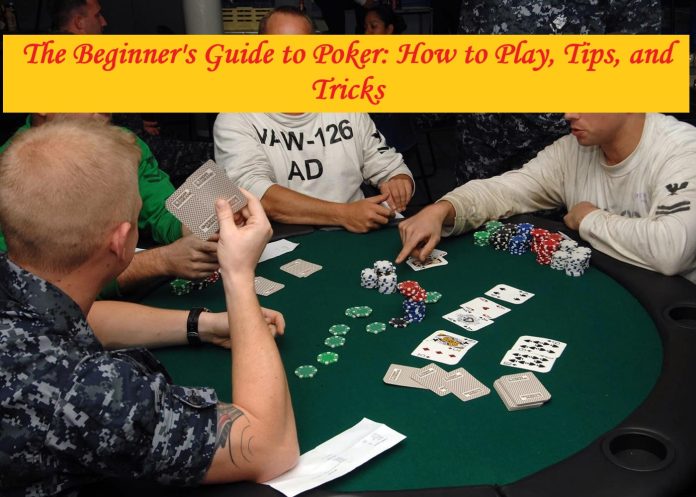The Beginner’s Guide
Poker has been around for millennia and is a popular card game. It is a game of skill, strategy, and luck that has captured the hearts and minds of people worldwide. It is a timeless game that millions have enjoyed worldwide for centuries. It is a game of skill, strategy, and luck that has captivated players from all walks of life.
If you’re a beginner to the game, the thought of playing poker online may seem intimidating, but fear not! In this beginner’s guide, we’ll cover everything you need to know to start playing online and offline poker. From the game’s basic rules to some valuable tips and tricks, you’ll have all the knowledge you need to start playing like a pro in no time. In recent years, online poker has become increasingly popular, providing players with the convenience and flexibility to play from the comfort of their homes. If you are a beginner at poker, this guide will give you all the information you need to get started, including how to play, tips, and tricks.
How to Play Poker?

It is a card game played with a standard 52-card deck. The game is played with two or more players, each trying to win the pot, the sum of all the bets made in hand. This game begins with each player being dealt two cards face down, called the hole cards. The game then proceeds with a series of betting rounds, with players having the option to fold, contact, or raise.
The game aims to build the finest five-card hand possible utilizing two-hole cards and five community cards. The community cards are handed face up in the middle of the table, the first three in the flop, the fourth in turn, and the fifth in the river. The pot is won by the player who has the better hand at the end of the hand.
Tips for Playing Poker
1. Understand the rules: It is essential to understand the game’s rules before playing poker. There are several poker varieties, each with its unique set of rules. Before you begin, study the rules of your specific interpretation.
2. Know your starting hands: The starting hand is the two hole cards dealt to each player in poker. Knowing which starting hands are strong and which are weak is essential. Strong starting hands include pairs, suited connectors, and high cards. Soft starting hands have low teams and non-suited cards with shared values.
3. Practice good bankroll management: Bankroll management is integral to playing poker. Make and stick to a budget for yourself. Don’t gamble with money you can’t afford to lose.
4. Pay attention to your opponents: In poker, paying attention to your opponent’s actions and behavior is essential. Look for tells, which are subtle physical or verbal cues that give away information about your opponents’ hands.
5. Be patient: Poker is a game of endurance. Don’t make hasty decisions. Take your time and make calculated decisions based on the information you have.
Tricks for Playing Poker
1. Bluffing: Bluffing is a technique used in poker to deceive opponents into thinking you have a more substantial hand than you do. Bluffing can be effective, but it should be used sparingly and cautiously.
2. Position: Position is an essential factor in poker. Players who act last have an advantage over players who work first, as they have more information about their opponents’ actions.
3. Reading your opponents: Reading your opponents is a critical skill in poker. Please pay attention to their actions, behavior, and tells. This will give you valuable information about their hand and their strategy.
4. Playing tight means only playing strong starting hands and folding weak ones. This is a conservative strategy that can be effective in certain situations.
5. Playing aggressively: Playing aggressively means betting and raising frequently. This strategy can be effective, but it should be used carefully and cautiously.

CONCLUSION
In conclusion, poker is a fascinating game requiring skill and strategy. Whether you’re looking to play casually with friends or compete professionally, the key to success is practice, patience, and a willingness to learn. With the tips and tricks outlined in this beginner’s guide, you should be ready to become a confident poker player. Remember to start small, focus on making good decisions, and don’t be afraid to ask for help or advice. And with the convenience of online poker, you can practice and improve from the comfort of your home. So, give it a try and enjoy the thrill of the game!
Rohan Mathawan
This article is authored by Rohan Mathawan, who is presently working as the Vice President of Media Sales and Operations at Techstory Media. Rohan started his career as an online gaming and technology content writer and has written more than 5000+ articles for reputed brands and companies like Techstory Media, MarketingCrap, and a few other ad agencies in the last 4 years. Rohan loves to read about online gaming during his pastime. His passion to create content about online gaming forces him to dive deep into the research of the topic and what comes out is a highly relevant and captivating piece of content that is appreciated by his readers.
Also Read: 10 Reasons To Choose Physics for a Bachelor’s Degree

Disclaimer: Playing online games involves an element of financial risk and may be addictive. Please play responsibly and at your own risk.

